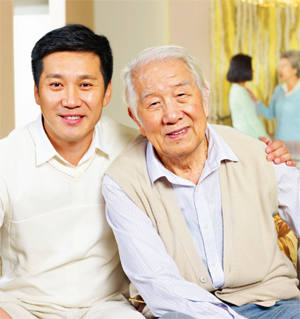
Today, 8.5 percent of people worldwide (617 million) are aged 65 and over (Cire B. 2016). The world’s elder population continues to grow at an unprecedented rate. In less than 15 years, according to Population.sg Team (2016 Aug 22), “the number of Singaporeans aged 65 and above is projected to double to 900,000”. That means the number from 1 in 8 Singaporeans today in that age group will be up to 1 in 4.
In this ageing society, caring for an elderly loved one may become a reality for many people when a parent reaches the point where living alone is no long a safe option. While caring for an elderly parent can be rewarding, it can also be completely overwhelming. If you’re relatively new to caregiving and are unsure where to start, here are a few tips to help you successfully ease into your new role and effectively care for you aging parent.
- Assess – first thing first, recognise the signs that your parent needs help in either physical or mental health. Focus on the areas like walking steadiness and gait, personal hygiene, cleanliness of the house, forgetfulness, loss of sight and hearing, incontinence, losing or gaining weight, and no longer enjoy doing what he or she used to.
- Plan – call for a family meeting to determine the primary care giver and other family members’ involvement in the long run. Come to an agreement that who pays what. Also to work out the plan that allows the primary care giver to have periodic breaks while other family members cover the duty.
- Organise – Gather important documents and information of your elder parent, such as personal details, medical and financial related. For example, parent’s IC, any health assist card, medical history or any referral letter or service contract, list of medication and dosing instruction, allergies, medical personnel’s contact details, insurance card or health insurance policy.
- Home safety – Installing some basic safety measures can go a long way to help you in caring for your loved one by reducing home related accidents. For example, install grab bars in bathrooms, set lower temperature of water heater, place anti-slip mat on steps and shower floors, put brighter light bulbs and organise power cables to prevent tripping hazards.
- Educate yourself – Find out everything you can about your parent’s condition and care needs, such as what type of medical care and therapies are needed, what to expect in terms of progression of symptoms and possible treatment plans.
- Communicate – keep the communication open throughout the caring process with your parents, medical professionals and family members about who will do what and how you can support each other.
- Be realistic – about your ability to help out and know your own limits. You should not try to do it all. For example, if the elderly parent is heavy for one person to lift, you should consider to hire help or get other family members involved.
- Explore resources – There are services that can help caregivers and their parents. Calling on community resources can help ease the responsibility of caregiving. Find out about the community services that you can tap on, such as government agencies, voluntary welfare organisations. These include home care services, meal delivery, transportation support, financial support schemes etc.
- Care for yourself – last but not least! It is normal for a caregiver to feel burnout, overwhelmed or helpless. Make an effort to give time for yourself to relax, eat well, exercise, see friends, and rest. Caring for yourself means better care for your parent.
Cire, B. 2016. World’s older population grows dramatically.
[https://www.nia.nih.gov/newsroom/2016/03/worlds-older-population-grows-dramatically]
Morris, V. (2014). How to Care for Aging Parents, 3rd Edition. New York: Workman Publishing Company, Inc
Laliberte, R. 2012. Learn everything you need to know about taking care of a loved one.
[http://www.womansday.com/relationships/family-friends/a6378/caregiver-elderly-parents/]
Population.sg Team. 2016. Older Singaporeans to double by 2030
[https://population.sg/articles/older-singaporeans-to-double-by-2030]


